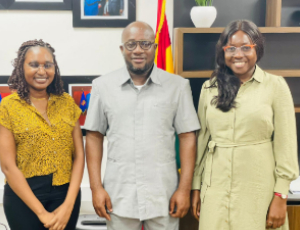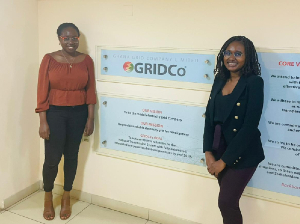
In 2021 Sandile Mtetwa (Department of Chemistry), Peace Adesina (Department of Chemical Engineering and Biotechnology) and Dr Ramit Debnath (Department of Architecture) were awarded a Small Grant by the Energy IRC for a project titled: ‘Energy Transition Policy in Sub-Saharan Africa: Using Ghana as a case study’. This was funded by the Isaac Newton Trust and Energy Policy Research Group (EPRG) with the purpose of supporting interdisciplinary research in energy between the humanities and social science on one hand and science and engineering on the other.
Ramit and Sandile are both Gates Cambridge Scholars, and a key part of their scholarship outcome is transdisciplinary collaboration. This award helped leveraging this goal and developing impactful links for solving global challenges. The funds were used to travel to Accra, Ghana, to visit energy stakeholders, including civil society and the private sector and interview key policymakers from government, who are currently drafting Ghana’s National Energy and Climate policy. This blog highlights some of the reflections from the visit.
Africa should be at the forefront of the energy transition! This is an ambitious yet imperative statement considering the ongoing climate change crisis. It is no secret that most African countries will be affected the most by global warming and with COP26 having come and gone, is Africa prepared and equipped for what comes next?
Multiple reports and articles have acknowledged how the Glasgow climate pact, one of the key outcomes of COP26, is a let-down to Africa and may be reflected by the fact that only 2 countries on the continent have officially made net zero pledges. Ghana is one of the countries that has not pledged to reach net zero, but this does not mean they are against climate change mitigation or an energy transition. Conversations with various energy stakeholders during our research trip in Ghana lamented slightly differing views of what energy transition means, however the underlying tone is the same. Ghana considers natural gas as their transitioning fuel as there are vast amounts of deposits of this resource in the country.
It makes economic sense and natural gas is also widely accepted as cleaner than crude oil and coal. Of course, the country should adopt more renewables (solar, wind, biomass) into their energy mix (which currently sits at ca. 1% on the grid) but the pace at which they do so may not be the same as that of developed countries. Unfortunately, the definition of ‘pace’ is ambiguous. What is a suitable timeline that African countries should give themselves and what does a successful energy transition look like for them? Is there a suitable ratio we can place on the energy mix between fossil fuels and renewables? Does Africa need to focus on ‘net zero’ considering lack of energy security and minimal carbon emissions per capita? These are difficult questions to answer.
The reality is that Africa should be operating with a futuristic lens, bearing in the mind the negative impact climate change has and will have on the continent, coupled with the vast renewable energy sources it possesses. However, a futuristic lens is not possible without adequate financial investments. During our interviews with energy stakeholders in Ghana this was a commonly quoted roadblock on a national level. There are 3 main reasons for this:
a) less carbon emissions are produced in the country, hence there is not much incentive for carbon reduction compared to other global south countries e.g., Asia and South America
b) high levels of government debt reduces trust by investors on the country’s ability to pay back loans
c) non-enabling environments which may include the political system and other social factors in the country
With green financing being a priority from the Glasgow Climate Pact, we hope to see tremendous changes in minimizing the financial impediment towards energy transition in Africa. This also needs to be in partnership with African governments cultivating enabling environments for foreign investment.
In my opinion the championing of energy transition by Africa should be expanded. In Ghana and many other African countries there seems to be huge optimism and capacity for the adoption of various renewable energy technologies however, there is still a lot of political barriers and economic constraints that plague the fruition of many projects. As such there needs to be a delicate balance between ensuring economic development of the country and avoiding being left behind in the global (energy) economy.
| Sandile Mtetwa is currently a researcher in the Wheatley Group Lab at the Yusuf Hamied Department of Chemistry, University of Cambridge. She is working on charge carrying metal-organic frameworks to investigate their potential applications in hydrogen evolution via photocatalytic water-splitting. Her motivation for this work lies in providing clean energy resources for multitudes of impoverished communities in Africa. Sandile also Chairs the Africans in STEM initiative (University of Cambridge), which aims to profile Black STEM excellence in the UK and beyond. |




